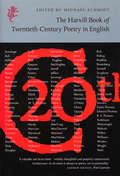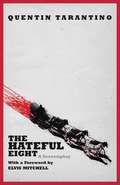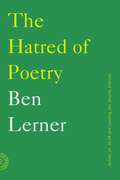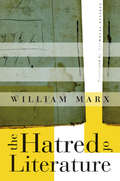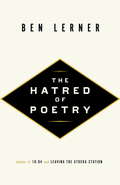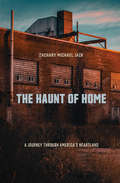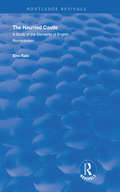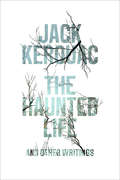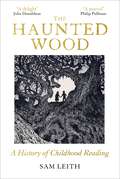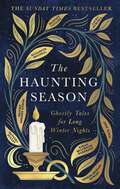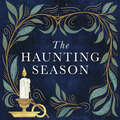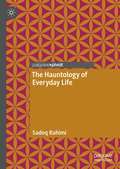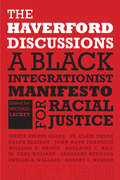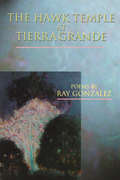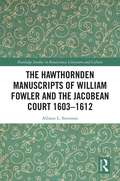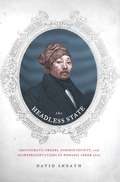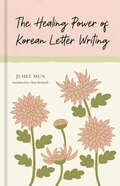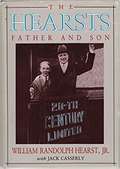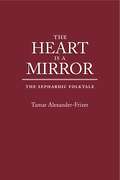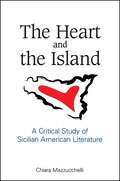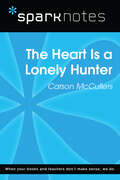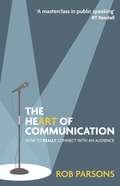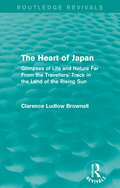- Table View
- List View
The Harvill Book of 20th Century Poetry in English
by Michael SchmidtMichael Schmidt’s anthology includes the work of more than a hundred poets from every part of the English-speaking world. What links their diverse voices is a common language: each poem, in its own way, adds to the resources of the medium and makes it new.The poems in this book are allowed to slip free of their moorings in the biography and history of the last century to create new spaces and times. They have been chosen because they are exceptional, profound and unique in what they do to language, regardless of their subject matter or the orientation of the poet. It is a powerful reminder that in the twentieth century poems did what they have never done before, and it provides us with a unique insight into the forces that will shape the poetry of the twenty-first century.
The Hateful Eight
by Quentin TarantinoAcademy Award-winning screenwriter Quentin Tarantino returns with his most infamous, most brilliant, most masterful screenplay yet... At the end of the Civil War, a stagecoach hurtles through the wintry Wyoming landscape. Bounty hunter John Ruth and his fugitive captive Daisy Domergue race toward the town of Red Rock, where Ruth will bring Domergue to justice. Along the road, they encounter Major Marquis Warren, a former Union soldier turned infamous bounty hunter; and Chris Mannix, a renegade who claims to be the town's new sheriff. Lost in a blizzard, Ruth, Domergue, Warren, and Mannix seek refuge at Minnie's Haberdashery, a stagecoach stopover. When they arrive, they are greeted by four unfamiliar faces: Bob, who takes care of Minnie's in the owner's absence; Oswaldo Mobray, the hangman of Red Rock; cow-puncher Joe Gage; and Confederate general Sanford Smithers. As the storm overtakes the mountainside, our eight travelers come to learn they may not make it to Red Rock after all ... THE HATEFUL EIGHT is a Tarantino master class in tension-filled atmosphere, singular characters, and razor-sharp dialogue.
The Hatred Of Poetry
by Ben LernerNo art has been denounced as often as poetry. It's even bemoaned by poets: "I, too, dislike it," wrote Marianne Moore. "Many more people agree they hate poetry," Ben Lerner writes, "than can agree what poetry is. I, too, dislike it and have largely organized my life around it and do not experience that as a contradiction because poetry and the hatred of poetry are inextricable in ways it is my purpose to explore." In this inventive and lucid essay, Lerner takes the hatred of poetry as the starting point of his defense of the art. He examines poetry's greatest haters (beginning with Plato's famous claim that an ideal city had no place for poets, who would only corrupt and mislead the young) and both its greatest and worst practitioners, providing inspired close readings of Keats, Dickinson, McGonagall, Whitman, and others. Throughout, he attempts to explain the noble failure at the heart of every truly great and truly horrible poem: the impulse to launch the experience of an individual into a timeless communal existence. In The Hatred of Poetry, Lerner has crafted an entertaining, personal, and entirely original examination of a vocation no less essential for being impossible.
The Hatred of Literature
by William MarxFor 2,500 years literature has been condemned in the name of authority, truth, morality and society. But in making explicit what a society expects from literature, anti-literary discourse paradoxically asserts the validity of what it wishes to deny. The threat to literature’s continued existence, William Marx writes, is not hatred but indifference.
The Hatred of Poetry
by Ben LernerNovelist and poet Ben Lerner argues that our hatred of poetry is ultimately a sign of its continued relevance.Poetry. Perhaps Marianne Moore said it best: "I, too, dislike it." What other art takes its marginality as a given, and is so widely bemoaned even by its practitioners? Ben Lerner writes, "Many more people agree they hate poetry than can agree what poetry is. I, too, dislike it and have largely organized my life around it and do not experience that as a contradiction because poetry and the hatred of poetry are inextricable in ways it is my purpose to explore."In this inventive and plain-spoken essay, Lerner takes the hatred of poetry as the starting point of his defence of the art. He examines both poetry's greatest haters (beginning with Plato, who famously claimed that an ideal city had no place for poets, who would only corrupt and mislead the young) and its greatest practitioners, providing inspired close-readings of Keats, Dickinson, Whitman, and others. Throughout, he attempts to explain the noble failure at the heart of every poem: the impulse to launch the experience of an individual into a timeless, communal existence. In The Hatred of Poetry, Lerner has crafted an entertaining, personal, and entirely original examination of a vocation no less essential for being impossible.
The Haunt of Home: A Journey through America's Heartland
by Zachary Michael JackWhat does it mean to deeply love a home place that haunts us still? From Mark Twain to Grant Wood to Garrison Keillor, regionalists from the Gilded Age to the Digital Age have explored the American Gothic and the homegrown fatalism that flourish in many of the nation's most far-flung and forgotten places. The Haunt of Home introduces us to a cast of real-life Midwestern characters grappling with the Gothic in their own lives, from promising young professionals debating the perennial "Should I stay or should I go" dilemma, to recent émigrés and entrepreneurs seeking personal reinvention, to faithful boosters determined to keep their communities alive despite the odds. In The Haunt of Home Zachary Michael Jack considers the many ways a region's abiding spirit shapes the ethos of a land and its people, offering portraits of others who, like himself, are determined to live out the unique promise and predicament of the Gothic.
The Haunted Castle: A Study of the Elements of English Romanticism (Routledge Revivals)
by Eino RailoPublished in 1927: The purpose of the present work is consequently to serve as a guide to English horror-romanticism and by presenting the chief materials used by it and grouping them according to the various themes employed, to show how the main romantic movement that began at the turn of the century and is represented in all shorter expositions of the subject as a suddenly bursting wave, as a kid of spontaneous revolution, is in all essentials the outcome of an organic development with widely spread roots that penetrate deep into the past.
The Haunted Life: and Other Writings
by Jack Kerouac Edited by Todd TietchenIn late 1944, under rather mysterious circumstances, aspiring writer Jack Kerouac lost a novella-length manuscript titled The Haunted Life. <P><P> Set in Galloway, a fictionalized version of Kerouac's hometown of Lowell, Massachusetts, the coming-of-age story of Peter Martin--a character based on the author's recently departed friend Sebastian Sampas--tackles the pressing issues of the day. At home in the working-class town the summer before his sophomore year at Boston College, Peter finds himself conflicted. Like many Americans, Peter is unsure, suspended between the economic crisis of the previous decade and the impending US entry into World War II. In The Haunted Life, Peter struggles to define what he believes to be intellectually true and worthy of his life and talents. Skillfully edited by Todd F. Tietchen, assistant professor of English at the University of Massachusetts-Lowell,The Haunted Life is rounded out by sketches, notes, and reflections Kerouac kept during the novella's composition as well as a revealing selection of correspondence with his father, Leo.
The Haunted Wood: A History of Childhood Reading
by Sam Leith*A Sunday Times, Irish Times, Financial Times, Independent, Daily Mail, TLS, Economist, Prospect, Evening Standard and New Statesman Book of the Year 2024* Can you remember the first time you fell in love with a book? The stories we read as children matter. The best ones are indelible in our memories; reaching far beyond our childhoods, they are a window into our deepest hopes, joys and anxieties. They reveal our past – collective and individual, remembered and imagined – and invite us to dream up different futures. In a pioneering history of the children&’s literary canon, The Haunted Wood reveals the magic of childhood reading, from the ancient tales of Aesop, through the Victorian and Edwardian golden age to new classics. Excavating the complex lives of our most beloved writers, Sam Leith offers a humane portrait of a genre and celebrates the power of books to inspire and console entire generations. *** 'A MARVEL' PHILIP PULLMAN 'A DELIGHT' JULIA DONALDSON 'GLORIOUSLY ENTERTAINING' TOM HOLLAND
The Haunting Season: Ghostly Tales for Long Winter Nights
by Andrew Michael Hurley Natasha Pulley Laura Purcell Kiran Millwood Hargrave Jess Kidd Imogen Hermes Gowar Bridget Collins Elizabeth MacnealEight bestselling authors. A dazzling new collection of original haunted tales. This is your indispensable companion to the long, dark nights this October. 'You won't find a more thrilling winter read this year, or a better line up of writers who have mastered the gothic and ghostly.' SARA COLLINS, Costa Award-winning author of The Confessions of Frannie Langton ______________Featuring new and original tales from: Bridget Collins Sunday Times bestselling author of The Binding | Imogen Hermes Gowar Sunday Times bestselling author of The Mermaid and Mrs Hancock | Kiran Millwood Hargrave Sunday Times bestselling author of The Mercies | Andrew Michael Hurley Sunday Times bestselling author of The Loney | Jess Kidd International award-winning author of Things in Jars | Elizabeth Macneal Sunday Times bestselling author of The Doll Factory | Natasha Pulley Sunday Times bestselling author of The Watchmaker of Filigree Street | Laura Purcell Award-winning author of The Silent Companions ______________Long before Charles Dickens and Henry James popularized the tradition, the shadowy nights of winter have been a time for people to gather together by the flicker of candlelight and experience the intoxicating thrill of a ghost story.Now eight bestselling, award-winning authors - all of them master storytellers of the sinister and the macabre - bring the tradition to vivid life in a spellbinding new collection of original spine-tingling tales.Taking you from the frosty Fens to the wild Yorkshire moors, to the snow-covered grounds of a haunted estate, to a bustling London Christmas market, these mesmerizing stories will capture your imagination and serve as your indispensable companion to the cold, dark nights. So curl up, light a candle, and fall under the spell of winters past . . .______________'Makes you feel oddly cosy, in the way only the best ghost stories can. Exquisitely crafted, I enjoyed every word.' FRANCINE TOON, Sunday Times bestselling author of Pine 'Brilliantly chilling . . . an absolute treat' ANNA MAZZOLA, author of The Unseeing 'Gorgeous . . . a book destined to be read and re-read' AMANDA MASON, author of The Wayward Girls
The Haunting Season: The instant Sunday Times bestseller and the perfect companion for winter nights
by Andrew Michael Hurley Natasha Pulley Laura Purcell Kiran Millwood Hargrave Jess Kidd Imogen Hermes Gowar Bridget Collins Elizabeth MacnealEight bestselling authors. A dazzling new collection of original haunted tales. This is your indispensable companion to the long, dark nights this winter. THE INSTANT SUNDAY TIMES BESTSELLER 'You won't find a more thrilling winter read this year, or a better line up of writers who have mastered the gothic and ghostly.' SARA COLLINS, Costa Award-winning author of The Confessions of Frannie Langton 'From today's finest writers of suspense, horror and historical fiction comes a chocolate-box collection of stories to savour alone or share . . . Best read by candlelight.' METRO ______________Featuring new and original tales from: Bridget Collins Sunday Times bestselling author of The Binding | Imogen Hermes Gowar Sunday Times bestselling author of The Mermaid and Mrs Hancock | Kiran Millwood Hargrave Sunday Times bestselling author of The Mercies | Andrew Michael Hurley Sunday Times bestselling author of The Loney | Jess Kidd International award-winning author of Things in Jars | Elizabeth Macneal Sunday Times bestselling author of The Doll Factory | Natasha Pulley Sunday Times bestselling author of The Watchmaker of Filigree Street | Laura Purcell Award-winning author of The Silent Companions ______________Long before Charles Dickens and Henry James popularized the tradition, the shadowy nights of winter have been a time for people to gather together by the flicker of candlelight and experience the intoxicating thrill of a ghost story.Now eight bestselling, award-winning authors - all of them master storytellers of the sinister and the macabre - bring the tradition to vivid life in a spellbinding new collection of original spine-tingling tales.Taking you from the frosty Fens to the wild Yorkshire moors, to the snow-covered grounds of a haunted estate, to a bustling London Christmas market, these mesmerizing stories will capture your imagination and serve as your indispensable companion to the cold, dark nights. So curl up, light a candle, and fall under the spell of winters past . . .______________'Makes you feel oddly cosy, in the way only the best ghost stories can. Exquisitely crafted, I enjoyed every word.' FRANCINE TOON, Sunday Times bestselling author of Pine 'Brilliantly chilling . . . an absolute treat' ANNA MAZZOLA, author of The Unseeing 'Gorgeous . . . a book destined to be read and re-read' AMANDA MASON, author of The Wayward Girls
The Haunting Season: The instant Sunday Times bestseller and the perfect companion for winter nights
by Andrew Michael Hurley Natasha Pulley Laura Purcell Kiran Millwood Hargrave Jess Kidd Imogen Hermes Gowar Bridget Collins Elizabeth MacnealTHE INSTANT SUNDAY TIMES BESTSELLER 'You won't find a more thrilling winter read this year, or a better line up of writers who have mastered the gothic and ghostly.' SARA COLLINS, Costa Award-winning author of The Confessions of Frannie Langton Featuring new and original tales from: Bridget Collins Sunday Times bestselling author of The Binding | Imogen Hermes Gowar Sunday Times bestselling author of The Mermaid and Mrs Hancock | Kiran Millwood Hargrave Sunday Times bestselling author of The Mercies | Andrew Michael Hurley Sunday Times bestselling author of The Loney | Jess Kidd International award-winning author of Things in Jars | Elizabeth Macneal Sunday Times bestselling author of The Doll Factory | Natasha Pulley Sunday Times bestselling author of The Watchmaker of Filigree Street | Laura Purcell Award-winning author of The Silent Companions ______________Long before Charles Dickens and Henry James popularized the tradition, the shadowy nights of winter have been a time for people to gather together by the flicker of candlelight and experience the intoxicating thrill of a ghost story.Now eight bestselling, award-winning authors - all of them master storytellers of the sinister and the macabre - bring the tradition to vivid life in a spellbinding new collection of original spine-tingling tales.Taking you from the frosty Fens to the wild Yorkshire moors, to the snow-covered grounds of a haunted estate, to a bustling London Christmas market, these mesmerizing stories will capture your imagination and serve as your indispensable companion to the cold, dark nights. So curl up, light a candle, and fall under the spell of winters past . . .
The Hauntology of Everyday Life
by Sadeq RahimiThis volume develops a comprehensive framework for applying the theory of hauntology to everyday life from ethnographic and clinical points of view. The central argument of the book is that all human experience is fundamentally haunted, and that a shift from ontological theory of subjective experience to a hauntological one is necessary and has urgent implications. Building on the notion of hauntology outlined by Derrida, the discussions are developed within the frameworks of psychoanalytic theory, specifically Jacques Lacan’s object relational theory of ego development and his structural reading of Freud’s theory of the psychic apparatus and its dynamics; along with the Hegelian ontology of the negative and its later modifications by 20th century philosophers such as Heidegger and Derrida; and the semiotics of difference introduced by Saussure and worked by Jakobson and others. This book argues and demonstrates the immediate relevance of hauntological analysis in everyday life by providing a microanalysis of the roles played by power, meaning and desire; and by using vignettes and data from ethnographic research and clinical settings, as well as references to literature, movies and other cultural products.
The Haverford Discussions: A Black Integrationist Manifesto for Racial Justice
by Michael LackeyIn the late sixties and early seventies, black separatist movements were sweeping across the United States. This was the era of The Autobiography of Malcolm X, Stokely Carmichael's and Charles Hamilton's Black Power, and Eldridge Cleaver's Soul on Ice. In 1969 a group of distinguished African American intellectuals met at Haverford College in order to devise strategies to dissuade young blacks from adopting a separatist political agenda. The participants included some of the most prominent figures of the civil rights era--Ralph Ellison, John Hope Franklin, and J. Saunders Redding, to name only a notable few. Although these discussions were recorded, transcribed, and edited, they were never published because the funding for them was withdrawn. This volume at last makes the historic Haverford discussions available, rescuing for the modern reader some of the most eloquent voices in the intellectual history of black America. Michael Lackey has edited and annotated the transcript of this lively exchange, and Alfred E. Prettyman has supplied an afterword. While acknowledging the importance of the black power and separatist movements, Lackey's introduction also sheds light on the insights offered by critics of those movements. Despite the frequent characterization of the dissenting integrationists as Uncle Toms or establishment intellectuals, a misrepresentation that has marginalized them in the intervening decades, Lackey argues that they had their own compelling vision for black empowerment and sociopolitical integration.
The Hawk Temple at Tierra Grande (American Poets Continuum #Vol. 72)
by Ray GonzalezKnown for his superrealism and magical images born of the imagery of the Chicano/South Western culture, Ray Gonzalez gives new imagery and intensity to the mystery and common miracles of that culture, the passionate reclamation of identity.Ray Gonzalez is a poet, essayist, and editor born in El Paso, Texas. He is the author of five books of poetry, including The Heat of Arrivals (BOA 1996), which won the 1997 Josephine Miles Book Award for Excellence in Literature, and Cabato Sentora (BOA 1999). He is the editor of twelve anthologies and serves as Poetry Editor of The Bloomsbury Review.Also available by Ray Gonzalez: The Heat of Arrivals TP $12.50, 1-880238-39-X o CUSA Cabato Sentora TP $12.50, 1-880238-70-5 o CUSA
The Hawthornden Manuscripts of William Fowler and the Jacobean Court 1603–1612 (Routledge Studies in Renaissance Literature and Culture)
by Allison L. SteensonThis book explores the unedited material contained in the Hawthornden manuscripts of William Fowler, a Scottish poet attached to the court of Queen Anna of Denmark between 1590 and 1612. The material is representative of Fowler’s ephemeral and occasional production, largely unknown to modern scholars. Through the lenses of the Hawthornden fragments, this book engages in the exploration of one of the "cultural places of the European Renaissance", represented by the extensive use of emblems and other literary devices, and by the use of manuscript copies to circulate them. The discourse mainly focuses on the Jacobean courtly establishment in the first decade of the seventeenth century, from the point of view of a Scottish insider. By focusing on the intellectual makeup of the court in the newly united Great Britain, this work aims at bridging manuscript scholarship and literary studies with a wider perspective on contemporary society, politics and culture.
The Headless State: Aristocratic Orders, Kinship Society, and Misrepresentations of Nomadic Inner Asia
by David SneathIn this groundbreaking work, social anthropologist David Sneath aggressively dispels the myths surrounding the history of steppe societies and proposes a new understanding of the nature and formation of the state. Since the colonial era, representations of Inner Asia have been dominated by images of fierce nomads organized into clans and tribes—but as Sneath reveals, these representations have no sound basis in historical fact. Rather, they are the product of nineteenth-century evolutionist social theory, which saw kinship as the organizing principle in a nonstate society.Sneath argues that aristocratic power and statelike processes of administration were the true organizers of life on the steppe. Rethinking the traditional dichotomy between state and nonstate societies, Sneath conceives of a "headless state" in which a configuration of statelike power was formed by the horizontal relations among power holders and was reproduced with or without an overarching ruler or central "head." In other words, almost all of the operations of state power existed at the local level, virtually independent of central bureaucratic authority. Sneath's research gives rise to an alternative picture of steppe life in which aristocrats determined the size, scale, and degree of centralization of political power. His history of the region shows no clear distinction between a highly centralized, stratified "state" society and an egalitarian, kin-based "tribal" society. Drawing on his extensive anthropological fieldwork in the region, Sneath persuasively challenges the legitimacy of the tribal model, which continues to distort scholarship on the history of Inner Asia.
The Healing Power of Korean Letter Writing
by Juhee MunA charming ode to the lost art of connecting through the handwritten letter, from the owner of the beloved Seoul stationery shop geulwoll"That which takes longer to arrive stays longer in the heart."Juhee Mun once doubted whether handwritten letters had a place in our ultra-fast-paced world, but the runaway success of her Seoul stationery shop geulwoll changed her mind. Established in 2019, the shop quickly became known as a tranquil place where people can write and send letters, buy gorgeous pens and letter paper, and sign up for a distinctive pen pal service: Customers can pick up a letter written by an anonymous pen pal—but only if they write one in return. Every day Mun witnessed customers enjoying the rare pleasure of sitting down and putting pen to paper, and in The Healing Power of Korean Letter Writing, she shares the joy with others who crave the unique type of connection and careful consideration that comes from handwritten letters.Through eighteen short chapters, from practical subjects like The Best Time to Write a Letter and Choosing Letter Paper and Envelopes to more sentimental ones like What Only Letters Can Do, Mun gently reveals the healing, nostalgic power of the written note. Personal stories and wisdom from famous letter-writers provide the encouragement for readers to craft touching, humorous, loving, and healing notes for everyone in their life—maybe even themselves, or a stranger. The Healing Power of Korean Letter Writing is the ultimate love letter to an age-old practice that fosters connection to yourself and others, and a potent antidote to the fast-paced, online world of today.
The Hearsts: Father and Son
by William Hearst<p>From San Juan Hill to San Simeon, from Patton's tanks to the Symbionese Liberation Army, the Hearst name has been at the forefront of American life for over a century. <p>As founder of the largest U.S. prewar media empire, William Randolph Hearst, Sr., forever changed the face of American journalism by using his newspapers to aid in forcing the outbreak of the Spanish-American War. As a public figure he was larger than life, first as ambitious congressman, then as reclusive yet active businessman in the famous castle that rises above the Pacific at San Simeon. The elder Hearst was known for his extravagance as well as his long affair with Marion Davies, images that were highly embellished in Orson Welles' reproach of the Hearst persona, Citizen Kane. <p>In The Hearsts: Father and Son, William Randolph Hearst, Jr., and co-author Jack Casserly tell the extraordinary story of an American family from the gold-diggings of California to the present Hearst media empire. They also profile a cavalcade of reporters and columnists who became the stars of the Hearst newspapers, and portray the colorful New York nightlife of the 1930s and 1940s.</p>
The Heart Is a Mirror: The Sephardic Folktale
by Tamar Alexander-FrizerSince their expulsion from Spain in 1492, Sephardic Jews have managed to maintain their Jewish faith and Spanish group identity and have developed a uniquely Judeo-Spanish culture wherever they settled. Among the important cultural ties within these Sephardic groups are Judeo-Spanish folktales, stories that have been passed down from generation to generation, either in the distinct language of the group, Judeo-Spanish (Ladino), or in other languages, such as Hebrew. In The Heart Is a Mirror, Tamar Alexander-Frizer examines the folk narratives of Sephardic Jews to view them both in relation to universal narrative traditions and the traditions of Jewish culture. In part 1, Alexander-Frizer investigates the relationship between folk literature and group identity via the stories' connection to Hebrew canonical sources, their historical connection to the land of origin, their treatment of prominent family members and historical events, and their connection to the surrounding culture in the lands of the Spanish Diaspora. Part 2 contains an analysis of several important genres and subgenres present in the folktales, including legends, ethical tales, fairy tales, novellas, and humorous tales. Finally, in part 3, Alexander-Frizer discusses the art of storytelling, introducing the theatrical and rhetorical aspects tied up in the Sephardic folktales, such as the storyteller, the audience, and the circumstances of time and place. This thorough and thought-provoking study is based on a corpus of over four thousand stories told by descendents of the Spanish Diaspora. An introduction addresses methodological problems that arise from the need to define the stories as Judeo-Spanish in character, as well as from methods used to record and anthologize them. Jewish studies scholars, as well as those interested in folktale studies, will gain much from this fascinating and readable volume.
The Heart and the Island: A Critical Study of Sicilian American Literature (SUNY series in Italian/American Culture)
by Chiara MazzucchelliIn The Heart and the Island, Chiara Mazzucchelli explores the strong bond between Sicilian American writers and the island of Sicily. Self-contained yet connected to the mainland, geographically separated from yet politically united to the rest of Italy, Sicily occupies a unique position. Throughout the twentieth century, the sense of a distinct sicilianità—or Sicilianness—has manifested itself in a corpus of texts that, although subsumed under the broader context of Italian literature, have distinguished themselves as examples of an exquisitely Sicilian literary experience. Mazzucchelli argues that a parallel phenomenon—sicilianamericanità—has emerged in the United States. Focusing on the island's geography, history, and culture, she examines how many American authors of Sicilian descent derive inspiration from their ethnic milieu and lay out a recognizable set of Sicilian culture markers in their works, thereby producing a literature that is distinctly Sicilian American. Drawing on both Italian and Italian American scholarship, The Heart and the Island is the first full-length study of Sicilian American literature, and it opens a space for new interdisciplinary discussions on what it means to be Italian on both sides of the ocean.
The Heart is a Lonely Hunter (SparkNotes Literature Guide Series)
by SparkNotesThe Heart is a Lonely Hunter (SparkNotes Literature Guide) by Carson McCullers Making the reading experience fun! Created by Harvard students for students everywhere, SparkNotes is a new breed of study guide: smarter, better, faster.Geared to what today's students need to know, SparkNotes provides:chapter-by-chapter analysis explanations of key themes, motifs, and symbols a review quiz and essay topics Lively and accessible, these guides are perfect for late-night studying and writing papers.
The Heart of Boswell
by James BoswellThis volume is a distillation of the first six volumes of "The Yale Editions of the Private Papers of James Boswell", which are in turn derived from discoveries and purchases of Boswell's papers at intervals between the year of his death, 1795, and the middle years of the present century. Boswell's journal not only survives but flourishes, providing him with existence unfolding far beyond his grave. Trepidation about his death, and questions of afterlife, occupy many pages of his writing, many hours of his reflection, and a position central in his conversation and his dreams.
The Heart of Communication: How to really connect with an audience
by Rob ParsonsThe ability to connect with an audience is an essential element of public speaking. While an effective presentation can have all the elements of good pace, pitch and body language, it can still leave an audience unaffected or unmoved. Rob Parson believes even the most proficient speakers can enhance their public speaking by focusing on the heart of communication: connection.For the first time, Rob Parsons shares his insights from over fifty years of experience. He unpacks methods that will help any public speaker - from how to prepare well and utilise the power of story, to giving top tips on avoiding common distractions. Readers will come away with a better grasp on public speaking - not only how to speak to the head, but to the heart.Having spoken to over a million people around the world, from multinational organisations to church congregations, Rob has fine-tuned approaches that can help anyone wanting to grow in this area.
The Heart of Japan: Glimpses of Life and Nature Far From the Travellers' Track in the Land of the Rising Sun (Routledge Revivals)
by Brownell Clarence LudlowThis collection of commentaries and reflections on Japanese culture, first published in 1904, was written shortly after the return of two English aristocrats from five years spent immersed in the ‘Land of the Rising Sun’. Their intention through these anecdotes – some humorous and charming, others tragic and thought-provoking – was to offer glimpses into the "real inner spirit of the native life," and to provide insights into the remarkable idiosyncrasies of Japanese society during a period of unprecedented change. Touching on such diverse topics as sport, religion, music, censorship, drama and bathing, The Heart of Japan will be of particular interest to students of Japanese, as well as to those intrigued by cultural difference and exchange.
